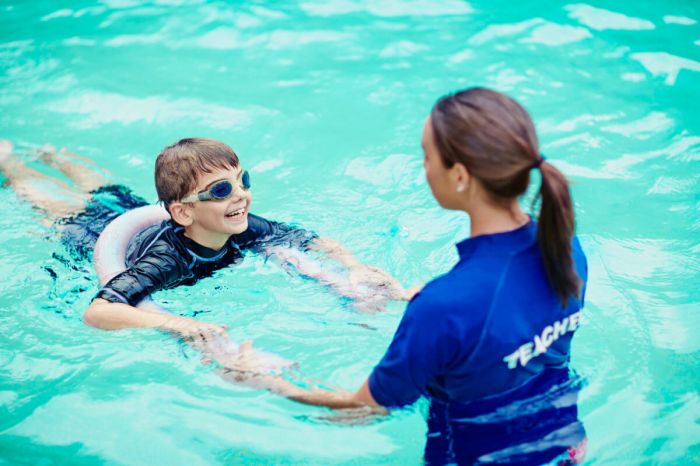Swimming lessons are more than just a dip in the pool – they offer a gateway to water safety, health benefits, and confidence. From choosing the right lessons to mastering different skills, let’s explore the world of swimming lessons.
Overview of Swimming Lessons

Swimming lessons are crucial for individuals of all age groups as they not only teach essential water safety skills but also provide numerous health benefits. Whether you are a child, teenager, or adult, swimming lessons offer a variety of advantages that go beyond just learning how to swim.
Benefits of Taking Swimming Lessons
- Improves cardiovascular fitness and muscle strength
- Enhances coordination and flexibility
- Boosts confidence and self-esteem
- Reduces the risk of drowning
Types of Swimming Lessons Available
There are different types of swimming lessons to cater to individual preferences and needs:
- Group Lessons: Ideal for social interaction and cost-effective learning in a group setting.
- Private Lessons: Tailored to individual needs, allowing for personalized attention and faster progress.
- Parent and Child Classes: Designed for infants and toddlers to introduce them to water safety and basic swimming skills.
Finding the Right Swimming Lessons
When it comes to finding the right swimming lessons, there are a few key factors to consider. From the qualifications of the instructors to the facilities offered, here are some tips to help beginners choose the best swimming lessons.
Qualifications of Instructors
- Look for instructors who are certified by reputable organizations such as the American Red Cross or the YMCA.
- Ensure that the instructors have experience working with beginners and are patient and encouraging.
- Ask about the instructor-to-student ratio to ensure individualized attention during lessons.
Facility Offerings
- Consider the location of the swimming facility and its accessibility for regular lessons.
- Check the cleanliness and safety protocols followed at the facility to ensure a hygienic learning environment.
- Explore additional amenities such as changing rooms, showers, and seating areas for parents or guardians.
Swimming Lesson Curriculum
Swimming lesson curriculum for beginners typically includes a gradual progression of skills and techniques to ensure a solid foundation in swimming. From basic water safety to stroke development, each lesson is designed to build upon the previous one.
Beginner Swimming Lessons
- Introduction to water safety and basic swimming techniques
- Learning floating and kicking techniques
- Introduction to arm movements and coordination
- Practice on breathing techniques and breath control
Progression to Advanced Lessons
- Refinement of stroke techniques such as freestyle, backstroke, breaststroke, and butterfly
- Introduction to more advanced swimming skills like flip turns and diving
- Building endurance and speed in swimming
- Advanced water safety skills and rescue techniques
Safety Measures and Skills Taught
- Proper breathing techniques to prevent swallowing water
- Supervision and monitoring of swimmers at all times
- Teaching swimmers how to recognize and respond to emergencies in the water
- Importance of warm-up exercises and stretching to prevent injuries
Benefits of Swimming Lessons

Swimming lessons offer a wide range of benefits that go beyond just learning how to swim. Let’s explore some of the key advantages below.
Improved Water Safety Skills
Swimming lessons play a crucial role in enhancing water safety skills. By learning how to swim properly, individuals can develop essential water survival techniques, such as treading water, floating, and proper breathing techniques. These skills are vital in preventing drowning incidents and ensuring personal safety in and around water.
Physical Health Benefits
Regular participation in swimming lessons can lead to significant improvements in physical health. Swimming is a full-body workout that engages various muscle groups and promotes cardiovascular fitness. It helps in building strength, endurance, and flexibility, while also improving coordination and motor skills. Moreover, swimming is a low-impact exercise, making it suitable for individuals of all ages and fitness levels.
Boosted Confidence and Self-Esteem
Swimming lessons not only contribute to physical well-being but also have a positive impact on mental health. Mastering new swimming techniques and overcoming water-related fears can boost confidence and self-esteem. The sense of accomplishment and progress achieved through swimming lessons can instill a sense of pride and empowerment in individuals, leading to improved self-confidence both in and out of the water.

